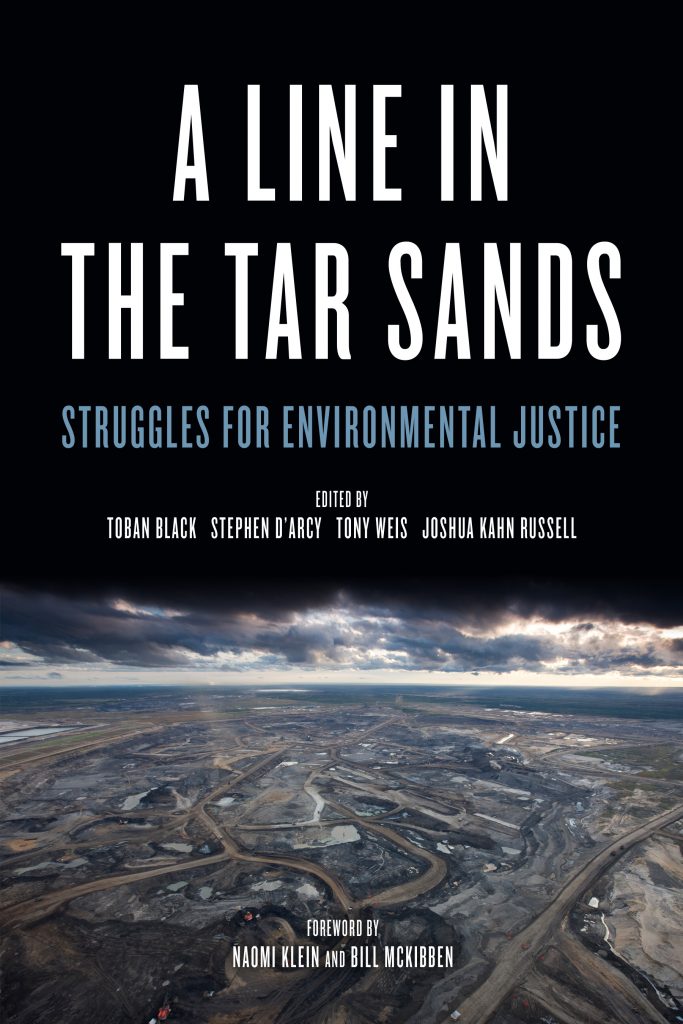By Jacob McLean
UnderCurrents
This fine collection belongs in the pockets of activists on the job: at a downtown rally or behind one of the many blockades resisting fossil fuels across the country and the globe. From the small details, such as the provision of a long list of excellent websites about the tar sands (partially reproduced be- low), to the overall structure, especial- ly the editorial focus on the voices of front-line activists, every aspect of this book lives up to its stated goal of being useful to activists. The achievement of that goal should not come as a surprise; of the four editors, three of them (Black, D’Arcy, and Russell) are notable for having managed to carve out careers that synthesize theory and practice. Black, for example, is an associate editor for the beloved Toronto-based Upping the Anti, described on their website as “a journal of theory and action.” D’Arcy, meanwhile, is the author of Languages of the Unheard: Why Militant Protest is Good for Democracy [reviewed in this volume]. And, finally, Russell is co- author of Organizing Cools the Planet, and has a blog called “praxis makes per- fect.” Rounding out the editorial quartet is Tony Weis, an Associate Professor in Geography at Western University whose research focuses on the ecologi- cal impacts of agriculture.
The book is divided into three parts. Part I, “Tar Sands Expansion- ism,” concentrates on the machinery which drives growth in the industry. The chapters include an analysis of the tar sands in the context of the history of petro-capitalism (Carter, Chapter 1); a study in the Canadian state’s efforts to lobby foreign governments to bend to the interests of tar sands investors (En- gler, Chapter 4); and an interview with migrant justice activist Harsha Walia, wherein the lesser-known story of “in- sourced” migrant tar sands workers is given much-needed attention (Walia and Russell, Chapter 7). The chapters in Part II, “Communities and Resistance,” feature the voices of activists from di- rectly impacted Indigenous communi- ties in Alberta, such as that of Melina Laboucan-Massimo of the Lubicon Cree (Chapter 10), and Crystal Lameman of the Beaver Lake Cree (Chapter 11). We also hear from U.S.-based activists struggling against Keystone XL (Chap- ters 16 & 17). If Part II predominately features dispatches from the front-lines of tar sands activism, Part III, “Future Prospects,” looks to take a bird’s-eye view and asks, ‘where are we going and how do we get there?’ Answers about where we might go after petro-capital- ism include Ojibwe economist Winona LaDuke’s prescription of “building an economics for the seventh generation” (Chapter 21), a proposal seemingly con- gruent with Greg Albo and Lilian Yap’s coy but crucial question, “[s]olar com- munism, anyone?” (Chapter 27).
One of the book’s key through-lines is the continual linkage made between the tar sands and settler-colonialism. In their introduction, for example, Black et al. demonstrate how Indigenous rights, especially the right to “free, prior, and informed consent” (FPIC) as laid out in the United Nations Declaration on the Rights of Indigenous Peoples (UNDRIP), are being “trampled on by the expan- sion of the tar sands.” Later on, Didikai Métis spoken word artist and anti-Line 9 activist Sâkihitowin Awâsis states un- equivocally, “[t]he tar sands industry is a form of colonization, both in the sense that it disproportionately affects Indige- nous communities and in the sense that it coercively plunders resources from Indigenous lands.” Despite the heaps of documentation provided in this volume that show the tar sands’ violation of In- digenous rights, there is an optimistic thread throughout the volume that ac- companies the sobering reality of pet- ro-colonialism.
For example, Clayton Thomas- Muller, the prominent environmental activist and member of the Mathias Colomb Cree Nation, guides the reader toward what he calls “the Native rights- based strategic framework.” Building on his first-hand experience organiz- ing in opposition to fossil fuel develop- ment, Thomas-Muller asserts, “there ha[s] not been a major environmental victory won in Canada in the last thirty years without First Nations at the helm asserting their Aboriginal rights and title.” This optimism—the belief that we can stop the tar sands with a broad In- digenous-led social movement—perme- ates the book, and is perhaps this book’s greatest gift. The book encourages us to develop solidarity between our various groups (e.g., between trade unions and environmentalists, and between anti- sexist, anti-racist, anti-colonial, and anti-capitalist movements) and to ally ourselves with those nations, like the Unist’ot’en, who are moving “beyond token recognition [of their rights]” (Mc- Creary, Chapter 14) such as that offered by the Canadian state, and are instead asserting their land title through direct action. It is this powerful through-line which stresses the importance of soli- darity and anti-colonial alliances that, I think, makes this book the finest to- date on the tar sands.
Hoping that this review of such an activist-oriented book might contain some of the usefulness of its subject, I have included below an abridged ver- sion of the book’s list of websites be- longing to organizations battling the tar sands:
• Defenders of the Land www.defendersoftheland.org
• Healing Walk www.healingwalk.org
• Honor the Earth www.honorearth.org
• Indigenous Environmental Network www.ienearth.org
• Keepers of the Athabasca www.keepersofthewater.ca
•MI CATS www.michigancats.org
•NRDC Pipeline and Tanker Trouble www.nrdc.org/international/ pipelinetrouble.asp
•Oil Sands Truth www.oilsandstruth.org
•Pipe Up Against Enbridge www.pipeupagainstenbridge.ca
•Rising Tide North America www.risingtidenorthamerica.org
•Tar Sands Solutions Network www.tarsandssolutions.org
•UK Tar Sands Network www.no-tar-sands.org
•Unist’ot’en Camp www.unistotencamp.com
•Utah Tar Sands Resistance www.tarsandsresist.org
•Yinka Dene Alliance www.yinkadene.ca
JACOB MCLEAN is a York University MES graduate, class of 2015, and former Under- Currents GA. He returned to the Faculty of Environmental Studies in the fall of 2016 to undertake doctoral research, which looks to uncover and dismantle the epistemologi- cal, ontological, and political underpinnings of fossil-capitalist-colonialism.
Back to Stephen D’Arcy, Tony Weis & Toban Black’s Author Page | Back to Joshua Kahn’s Author Page







